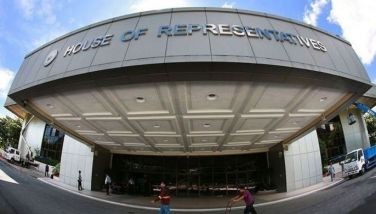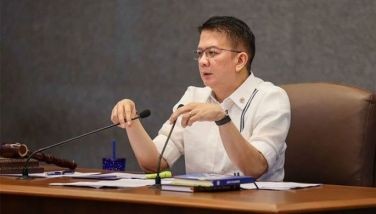China opens cinema on disputed SCS island
MANILA, Philippines - Soldiers and residents on one of the islands China controls in the contested South China Sea can now relax and watch a movie after the first theater in the strategic waterway opened its doors Saturday, reports say.
In its online version, Japan Times quoted Xinhua news agency as saying over 200 residents and soldiers of Sansha city on Woody Island, called Yongxing Island by China, turned out to view a Chinese film and mark the opening of the country’s southernmost cinema.
“The cinema will show at least one film every day, so residents and soldiers on Yongxing Island can enjoy films simultaneously with moviegoers across the country,” Xinhua quoted Gu Xiaojing, general manager of Hainan Media Croup, as saying.
The Xinhua report said the theater on Woody Island – the largest in the Paracel chain and home to a key airbase – is equipped with advanced projection equipment, “including the latest 4K digital projectors as well as a 3-D perforated screen.”
The operator of the cinema has also purchased two mobile projection units and plans to screen films for free on more islands within the municipality, the report said. The cinema is part of a plan by local authorities to establish more community services on the islands under Sansha’s jurisdiction, Xinhua said.
Sansha also boasts a library and stadium.
China has previously said it plans to build hotels, villas and shops on the Crescent group, of which Woody Island is a part. It has also announced a goal of building Maldives-style resorts throughout the South China Sea, though it is unclear if foreigners will ever be allowed to visit there due to apparent security concerns.
The theater and amenities could help residents and soldiers take their minds off the simmering dispute over the South China Sea, the Japan Times reported.
China began allowing tourist cruises to the area in 2013 in an effort to buttress its claims to the South China Sea by touting the civilian infrastructure there.
It says much of the construction binge has been for civilian purposes, though the US and other regional nations have blasted China for militarizing the waters, through which $5 trillion in trade passes each year.
The Philippines, Vietnam, Malaysia, Taiwan and Brunei also have overlapping claims in the waters, with Hanoi and Taipei also laying claim to Woody Island – China’s administrative base for islands and reefs it controls in the waterway.
China has built seven man-made islands in the Spratly chain, south of the Paracels, where it has militarized those outposts, constructing military-grade airfields and installing what it says is “defensive” weaponry.
Maintain stability
Chinese Foreign Minister Wang Yi, who is in Manila for a two-day official visit, yesterday said Beijing wanted to maintain stability in the South China Sea as it seeks alliances in the region amid tensions in the disputed waters.
Addressing the South China Sea issue, Wang told reporters during an official visit in Bangkok that China would like to “maintain stability in the South China Sea, abiding by the terms that have been agreed on the Declaration of Conduct and Code of Conduct in near future.”
China and Southeast Asian countries agreed in May to a framework for a long-proposed code of conduct for the disputed waters.
Wang’s visit comes ahead of a regional meeting of Southeast Asian countries in Manila next month.
“China and Thailand are like brothers,” Wang said.
Thai Foreign Minister Don Pramudwinai praised Thai-Chinese relations, saying there were “no obstacles” to the relationship between the two. Thailand, which has maintained a neutral stand on the issue, has this year approved Chinese submarines, tank and helicopter purchases worth more than $500 million.
Last month, it also approved the construction of the first phase of a $5.5-billion railway project to link the industrial eastern seaboard with southern China through landlocked Laos, part of China’s One Belt One Road regional infrastructure drive.
The project, which has been held back by delays, was pushed through after junta chief Prayuth Chan-ocha invoked an executive order known as Article 44.
Wang said he hoped the rail project would “elevate” Thailand’s status in the region and that the two countries would overcome differences to bring the rail project to fruition.
- Latest
- Trending





























